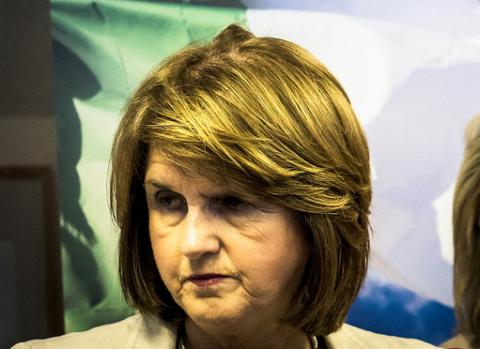On Labour Women's statement on the Fiscal Treaty

Labour Women's recent statement calling for a Yes vote on Thursday implies, incredibly, that the solution to the problems created by Ireland's financial dependence is to sign up to more of it. By Wendy Lyon.
Earlier this month, several female elected representatives of the Labour Party held a press conference and issued a statement calling for a Yes vote in Thursday’s EU Fiscal Treaty referendum. Their message was aimed at women, and Mairéad Enright has a good piece here pointing out the tired essentialism in their appeal.
The first thing I thought of when I read this was a poster put up by the Yes side during one of the last referendum campaigns:
 I never saw the “Ireland for Europe” group’s explanation of what they meant by this slogan – safer from what? – but the message was pretty clear. It was written in the first person singular, “I” rather than “We”, indicating personal and not collective safety. It featured a woman – can you imagine it featuring a man? – of an age where personal safety is likely to be a matter of significant concern; she is past the fearlessness of youth, but is neither so old that voters see her age before her gender, nor too young for senior women to identify with. In short, she is Everywoman, with the exception only of those women young enough to be targeted in the “young people” category. While the Yes campaign generally traded on fear, it was a peculiarly gendered, intimate type of fear that this poster aimed at instilling.
I never saw the “Ireland for Europe” group’s explanation of what they meant by this slogan – safer from what? – but the message was pretty clear. It was written in the first person singular, “I” rather than “We”, indicating personal and not collective safety. It featured a woman – can you imagine it featuring a man? – of an age where personal safety is likely to be a matter of significant concern; she is past the fearlessness of youth, but is neither so old that voters see her age before her gender, nor too young for senior women to identify with. In short, she is Everywoman, with the exception only of those women young enough to be targeted in the “young people” category. While the Yes campaign generally traded on fear, it was a peculiarly gendered, intimate type of fear that this poster aimed at instilling.
The Labour Women statement of the current campaign isn’t quite so brazen, but there is still a current of intimate fear running through it. Note, again, the reference to women’s safety in their support for the Treaty:
"Joan Burton opened by reminding us that for women a YES vote is the safest option."
There is very little in the statement about what the Treaty will actually do to improve women’s lives – in fact, one of the speakers openly admits to the lack of direct positive consequences of a Yes – but a lot about what might happen if we don’t pass it, which Labour Women threaten could amount to no less than “devastation” for “you and your family”.
As Enright’s post shows, the statement makes a lot of suggestions as to why a Yes vote should appeal to our womanly nature. But it gives only one real concrete reason to vote for it: to get access to European Stability Mechanism funding. Without this funding, it is implied, social welfare will have to be cut, gender inequality will worsen, poverty will increase. Not mentioned is the fact that the Treaty also requires a commitment to the same austerity measures that have already led to social welfare being cut, gender inequality worsening and poverty increasing. Measures which Labour themselves have been implementing in government, through the very woman (Joan Burton, the Social Protection Minister) who opened this press conference.
Labour, of course, were firmly opposed to austerity while in opposition. In her response to the final budget of the previous government, Minister Burton said:
“There is enough austerity in today’s announcement by the Minister, Deputy Lenihan, to make even the most ardent Tea Party fan grin in delight. There is pain for the poor, money for the rich, particularly for the bankers, and the rolling back of the State.
"What has all the austerity and deflation done for us as a country so far? In more than two and quarter years of austerity, unemployment has risen from 4% to 14%, which is 435,000 people. Austerity has slashed growth, it has killed consumer confidence and turned us into a nation who are busy paying down debt or saving – anything but spending.
"We all know about the famous three Rs that are the bedrock of early education. There is another set of three Rs that became the bedrock of economic recovery in the post-Depression era and formed the basis of the post-war politics in Europe, irrespective of the country or party in power. These three Rs are reflation, redistribution and reform. If the Labour Party is in Government after the next election, reflation, redistribution and reform will be what its participation in government will be about.”
During the election campaign, plenty more promises like that were made by Labour, and all of them were broken. The three Rs we’ve got from this government have been recession, redundancies and repossessions. When asked to explain this about-face, Labour often responds by blaming the EU-ECB-IMF Troika. Burton again:
"I am conscious that the reforms which are on the table may be painful for some in the short-term.
"But we are constrained in what we can achieve by the fact that we are living on borrowed money, borrowed money which comes with many conditions attached."
In other words, having loaned Ireland the money it needs to run itself, the IMF and its Troika partners are also dictating how it is spent. The internal Labour line, or so I’ve been told by a party apparatchik, is that the Troika has people with veto power monitoring every government department. Now either that’s not actually true and the Labour/Fine Gael government are implementing these measures of their own accord, or Ireland is part of what can only be deemed an extremely unhealthy relationship of financial dependence, in which the other party controls all the purse strings.
The Labour Women statement, incredibly, implies that the solution to the problems created by this financial dependence is to sign up to more of it. The statement admits that the Treaty won’t bring us jobs, investment and growth, but since Ireland can’t access ESM funds without it, we depend on this treaty to be passed to have a more secure future
At the end of the day, this is really what it’s all about: “security” is equated with “access to [someone else's] money”. And to be entirely dependent on someone else’s money but have little control over what we can do with it, that’s not a bad thing. To be making huge sacrifices in a relationship that we’re not getting anything else out of – including things that we really need – that’s not a bad thing either. Forget things like autonomy, self-fulfilment and self-determination; as long as we have that security in our lives, that’s all that matters.
What kind of message does that send to women? {jathumbnailoff}
Originally published at Feminist Ire. Reproduced with permission.
Image top: infomatique.
